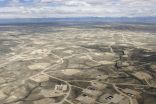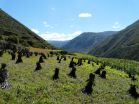(Press-News.org) MISSOULA - Improved drilling technologies and energy demand have resulted in the large-scale expansion of oil and gas development, with 50,000 new wells drilled per year recently in central North America. Locations such as the Bakken, Eagle Ford and the Marcellus Shale are now commonplace, and drilling activity frequently makes news.
But what are the ecological consequences of this accelerated drilling activity? Researchers at the University of Montana have conducted the first-ever broad-scale scientific assessment of how oil and gas development transforms landscapes across the U.S. and Canada.
Their work was published April 24 in an article titled "Ecosystem services lost to oil and gas in North America" in Science, one of the world's most prestigious journals. The article concludes that oil and gas development creates significant vegetation loss of rangelands and croplands across broad swaths of central North America.
Lead author Brady Allred said, "There are two important things here: First, we examine all of central North America, from the south coast of Texas to northern Alberta. When we look at this continental scale picture, we see impacts and degradation that are missed when focusing only at a local scale. Second, we see how present policies may potentially compromise future ecosystem integrity over vast areas."
Allred and co-authors estimated that from 2000 to 2012 oil and gas development removed large amounts of rangeland vegetation, culminating at a rate per year of more than half of the annual grazing on U.S. public lands. Vegetation removed by this development on croplands is equivalent to 120.2 million bushels of wheat, approximately 13 percent of all wheat exported by the U.S. in 2013.
Fragmentation and loss of habitat also disrupts wildlife migration routes, alters wildlife behavior and assists new disruptive invasive plant species. Co-author Dave Naugle highlights the complexity of the issue: "We've known about the impacts of oil and gas development for years, but we now have scientific data from a broad regional scale that tells us we need to act now to balance these competing land uses."
Furthermore, nearly half of wells drilled are in extreme- or high-water-stress regions. High-volume hydraulic fracturing uses 2 million to 13 million gallons of water per well, intensifying competition among agriculture, aquatic ecosystems and municipalities for water resources.
"We need a policy framework that quantifies and weighs major tradeoffs at large scales because current policy does not address both assessment and future mitigation adequately," said co-author Julia Haggerty of Montana State University.
"Satellite technologies now can provide annual acre-by-acre information for land managers on oil-and-gas-driven land-use changes," said Steve Running, a co-author and UM Regents Professor of Ecology. "We must have policies that ensure reclamation of this land after production has ended. Otherwise, by 2050, tens of millions of acres of land will be permanently degraded."
The authors assessed the ecosystem services lost by using high-resolution satellite measurements of vegetation growth based on methods developed by co-author W. Kolby Smith and previous groundbreaking research by Running. Terrestrial plant production is the foundation of the biospheric carbon cycle and the basis for a multitude of critical ecosystem services.
INFORMATION:
Allred is assistant professor of rangeland ecology at UM's College of Forestry and Conservation. Additional co-authors are W. Kolby Smith, a recent UM doctoral student now at the Institute on the Environment at the University of Minnesota; Dirac Twidwell from the University of Nebraska-Lincoln; and Samuel Fuhlendorf from Oklahoma State University.
Casting a large interdisciplinary research net has helped Simon Fraser University archaeologist Dana Lepofsky and 10 collaborators dig deeper into their findings about ancient clam gardens in the Pacific Northwest to formulate new perspectives.
Lepofsky's research team has discovered that Northwest Coast Indigenous people didn't make their living just by gathering the natural ocean's bounty. Rather, from Alaska to Washington, they were farmers who cultivated productive clam gardens to ensure abundant and sustainable clam harvests.
In its new paper published by American ...
Being bigger and bolder holds various benefits for male soldier beetles. They enjoy higher rates of successful courtship and more often land a larger, more fertile mate. These are some of the findings of a study led by Denson McLain of the Georgia Southern University in the US, published in Springer's journal Behavioral Ecology and Sociobiology.
The goldenrod soldier beetle or Pennsylvanian leatherwing (Chauliognathus pennsylvanicus) is native to Northern America. During its peak reproductive season, between September to early October, it only mates once a day. This normally ...
CHICAGO -- Genetic testing of Iñupiat people currently living in Alaska's North Slope is helping Northwestern University scientists fill in the blanks on questions about the migration patterns and ancestral pool of the people who populated the North American Arctic over the last 5,000 years.
"This is the first evidence that genetically ties all of the Iñupiat and Inuit populations from Alaska, Canada and Greenland back to the Alaskan North Slope," said Northwestern's M. Geoffrey Hayes, senior author of the new study to be published April 29, 2015, in the American ...
PULLMAN, Wash.--Climate change may be responsible for the abrupt collapse of civilization on the fringes of the Tibetan Plateau around 2000 B.C.
WSU archaeologist Jade D'Alpoim Guedes and an international team of researchers found that cooling global temperatures at the end of the Holocene Climatic Optimum, a 4,000 year period of warm weather, would have made it impossible for ancient people on the Tibetan Plateau to cultivate millet, their primary food source.
Guedes' team's research recently was published online in the Proceedings of the National Academy of Sciences. ...
A vaccine containing a protein necessary for virus replication can boost an HIV-infected patient's immune system, according to clinical research published in the open access journal Retrovirology. This boost can result in increased effectiveness of antiretroviral drugs.
When people are first diagnosed with HIV they are put on antiretroviral drugs, also known as highly active antiretroviral therapy (HAART). These drugs can stop the virus reproducing almost completely. When taking HAART, however, it is known that the virus can still replicate at low levels and accumulate ...
For patients in the early stage of non-small cell lung cancer, surgical resection yields optimal outcomes. Prior investigations have shown that different resection procedures have very different outcomes, with pneumonectomy associated with three-fold higher mortality than other resection types. While it is understandable that pathological and physiological factors influence a surgeon's choice of surgery for a particular patient, the results presented in this study suggest that physician discomfort with the operative complexities of a procedure may lead to selection of a ...
Hospital readmission rates after major thoracic surgery can run as high as 10-17%. Alarmingly, readmission after pulmonary resection for lung cancer has been associated with worse outcomes, including higher mortality. Thus, reducing readmissions after thoracic surgery can both save lives and reduce healthcare costs. Studies in internal medicine and cardiology have shown that programs that improve the transition from hospital to post-discharge care can be effective in decreasing emergency room visits and re-hospitalization. This study from McMaster University describes for ...
People suffering from the common lung disease, chronic obstructive pulmonary disease (COPD), have an increased risk of sudden cardiac death (SCD), according to new research published online today (Wednesday) in the European Heart Journal [1].
When compared with people of the same age and sex who do not have the disease, those with COPD have a 34% increased risk of SCD overall, but their risk almost doubles more than five years after first being diagnosed with COPD. In COPD patients who have frequent exacerbations (sudden worsening of their symptoms, such as shortness ...
Marine ecosystems can be changed by night-time artificial lighting according to new research published in the Royal Society journal Biology Letters. The results indicate that light pollution from coastal communities, shipping and offshore infrastructure could be changing the composition of marine invertebrate communities.
Researchers from the Universities of Exeter and Bangor used a raft in the Menai Strait to monitor how artificial light at night affects the settlement of marine invertebrates into new habitats. Light is an important cue which guides the larvae of marine ...
New research by scientists at New Zealand's University of Otago suggests a need for a fundamental rethink of the evolutionary path of enzymes, the proteins vital to all life on Earth.
Enzymes catalyse a vast array of biologically relevant chemical reactions even in the simplest living cells.
Biochemist Dr Wayne Patrick says that people tend to imagine evolution as a slow and steady march from barely functional life forms in the primordial soup, towards a modern-day pinnacle of near perfection.
"When it comes to enzyme evolution, this is also the textbook version ...


